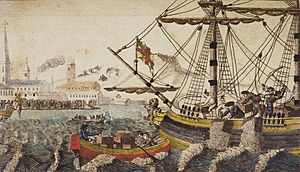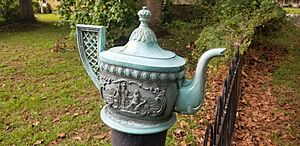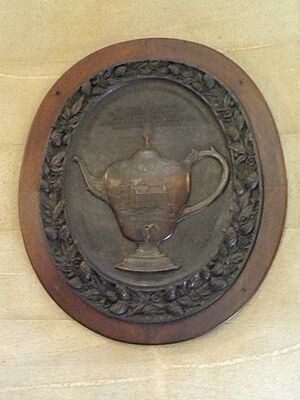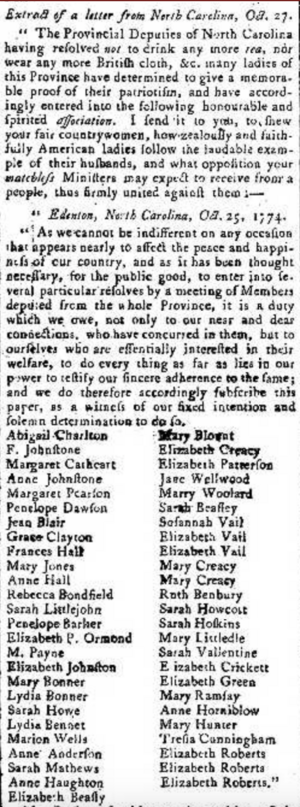Edenton Tea Party facts for kids
The Edenton Tea Party was a special protest that happened in Edenton, North Carolina. It was a way for people to show they were unhappy with the Tea Act. This act was a law passed by the British Parliament in 1773.
In October 1774, 51 women from Edenton and nearby areas signed a paper. This paper, dated October 25, 1774, showed they supported a boycott of British goods. This boycott was decided by the first North Carolina Provincial Congress. It was a protest against how the British Crown was treating the American Colonies. This protest was one of the many events that led to the American Revolution (1775–1781).
The statement signed by the 51 women was called the "Edenton Resolves." It is one of the first known protests planned and written by women in the American Colonies. This protest later became known as the "Edenton Tea Party."
Why the Protest Started
The British government put taxes and rules on the American Colonies. This was to help pay for the money spent during the French and Indian Wars (1754–1763). They also taxed the size of colonists' homes. But the colonists had no say in the British Parliament. This meant they had "no taxation without representation."
When the Tea Act of 1773 was passed, colonists became very angry. This law gave the British East India Company a special right to be the only seller of tea in the colonies. Tea was important to colonists for a few reasons. Drinking tea was safer than drinking water back then. It was also a sign of being fancy and rich. Plus, it was a long-standing daily tradition for the British. Social events in the colonies often centered around tea.
The British wanted to use the tax money from the colonists. This money would help make judges and governors loyal to the British. It would also show that Britain was in charge of the thirteen colonies.

In 1774, the First Continental Congress decided to stop buying British teas and fabrics. This was called a boycott. At that time, women were often seen as delicate and not very smart. They were not expected to be interested in public matters. Women were supposed to marry, have children, and focus on their homes. But by the 1700s, many women could read newspapers. Through these papers, women learned about political events.
Women were very important for the boycotts. They had to find other things to use instead of British tea, cloth, and other taxed goods. It was important to have their support for these protests. Colonial women stopped buying all British imports. They even formed groups and signed statements, like the Edenton Tea Party. They encouraged other women to protest against taxes without representation. Unlike the men of the Boston Tea Party, the women did not hide who they were. There were similar tea parties in other port cities. Protesting and boycotting gave women a chance to act as patriots. They stood with men on this important political issue.
The Edenton Tea Party Event
In October 1774, 51 women from Edenton and the area signed a statement. It was dated October 25, 1774. This paper supported the decisions made by the first North Carolina Provincial Congress. Those decisions had been made in August to protest the British Tea Act of 1773.
The "Edenton Resolves" statement said:
Edenton, North Carolina, Oct. 25, 1774. We care deeply about what happens to our country. It has been decided that for the good of everyone, we should agree to certain rules. These rules were made by a meeting of leaders from our whole Province. We feel it is our duty to support these rules. We owe it to our families and to ourselves, as we are all affected by this. So, we sign this paper to show our strong promise to follow these rules.
This statement was signed by 51 women. The "Edenton Resolves" first appeared in a newspaper called the Virginia Gazette on November 3, 1774. Then, London newspapers printed it in January of the next year.
What Happened After
In England, people often made fun of women who spoke about politics. So, the reaction in England was mostly negative. But in the American Colonies, women who protested against "taxation without representation" were often praised as patriots. After the "Edenton Resolves" were published, other women also stopped drinking tea.
Women in the South wore fancy dresses made from homespun fabric. This was part of the homespun movement. Women in the North held "spinning bees" to make homemade cloth. A ship full of tea from the East India Company was kept locked away in Charles Town (now Charleston, South Carolina) for months. This was because it could not be sold with the tax.
When the Revolution began, a group of patriots took the tea. They sold it to other patriots to help pay for the fight against the British. The Daughters of Liberty, like the Sons of Liberty, also boycotted British goods.
For a long time, not much was written about the Edenton Tea Party. The first book about it was The Historic Tea Party of Edenton, 1774 by Richard Dillard in 1892. In 1907, Mary Dawes Staples wrote an article called The Edenton Tea Party. It was published by the Daughters of the American Revolution (DAR).
In 1908, the Daughters of the American Revolution of North Carolina put up a plaque. It was placed in the state Capitol Building in Raleigh, North Carolina. It honored the women's leadership at the Edenton Tea Party. In 1940, a marker was placed in Edenton. It says, "Women in this town led by Penelope Barker in 1774 resolved to boycott British imports. Early and influential activism by women."
See also
- Boston Tea Party
- Philadelphia Tea Party
- Continental Association adopted on October 20, 1774
 | Jessica Watkins |
 | Robert Henry Lawrence Jr. |
 | Mae Jemison |
 | Sian Proctor |
 | Guion Bluford |




